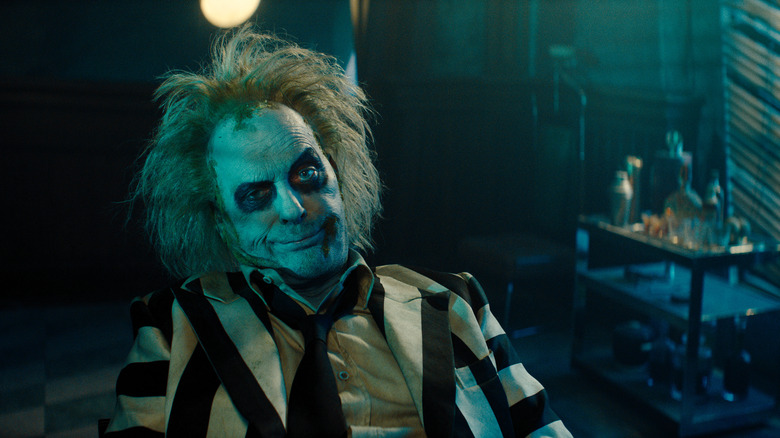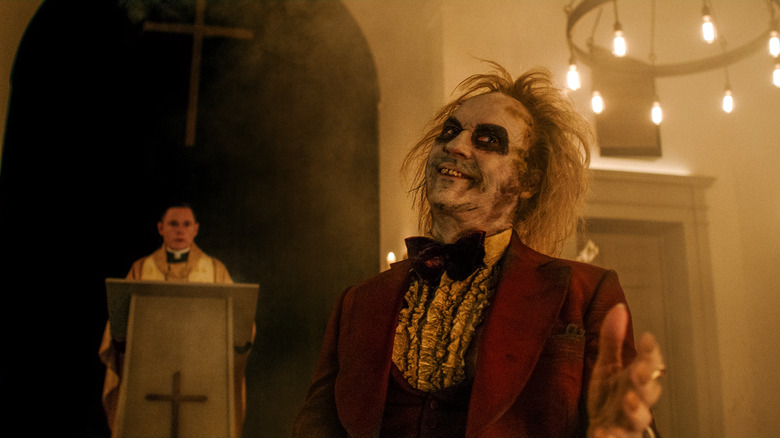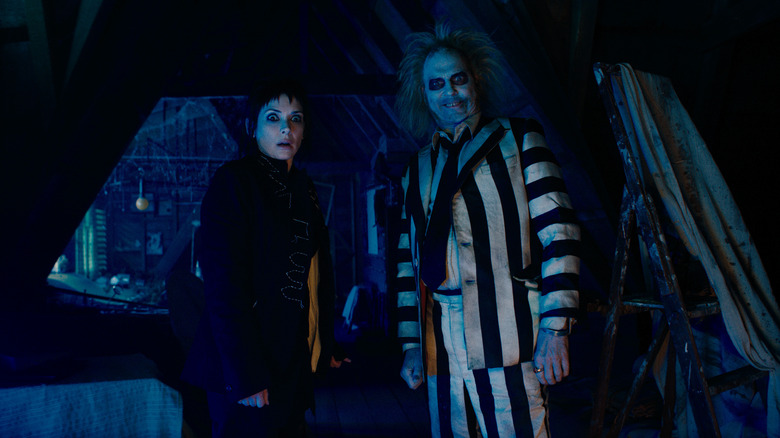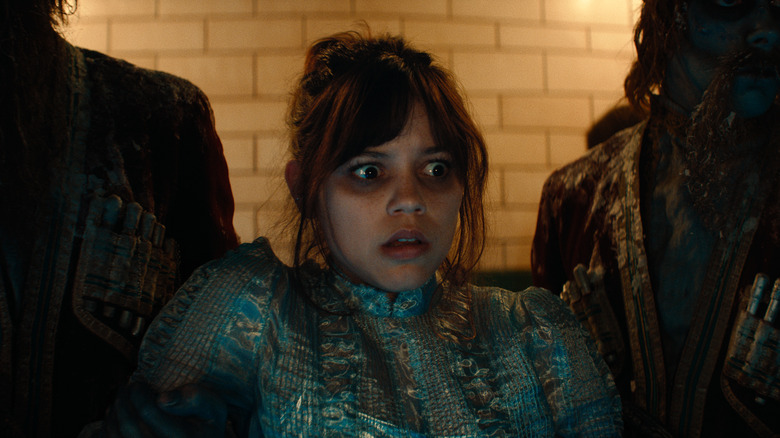Beetlejuice Beetlejuice Review: Tim Burton Gets His Mojo Back In This Funny, Shaggy Sequel
The beauty of Tim Burton's 1988 gonzo masterpiece "Beetlejuice" is that it feels like the undiluted vision of a mad man. A singular artist, working against a certain number of constraints, with a script that defies logic and good taste. The fact that the film got made at all is one of those little Hollywood miracles. The fact that it was a hit, and launched a few major careers, boggles the mind.
36 years later, we have "Beetlejuice Beetlejuice," a long-gestating sequel that arrives in a very different landscape. Tim Burton is now an established mainstream brand as much as he is a film director. Winona Ryder is enjoying a career resurgence for a new generation thanks to her work in the streaming world. And Michael Keaton's Beetlejuice, a grotesque, horny, utterly loathsome creep will pose for pictures with you at theme parks. It would've been easy for the sequel to sand off the edges, to go through the motions, to phone it all in.
But it doesn't do that. While "Beetlejuice Beetlejuice" can't quite match the highs of the original (how could it?), it's a film that's directly and distinctly in-tune with its predecessor. By returning to the scene of a past masterpiece, Burton has recaptured the lightning that made him a household name in the first place, that maniacal, go-for-broke energy that was so popular and special that time has only made it mainstream. "Beetlejuice Beetlejuice" doesn't feel like it's shattering a mold, but it certainly does a fine job of reminding us why that mold-shattering was so deeply impactful in the first place.
A tale of change and the un-changing
Picking up decades after the events of the first film, "Beetlejuice Beetlejuice" wisely leans into the passage of time. Lydia Deetz (Ryder), once an eccentric social outcast whose ability to communicate with ghosts left her isolated and sardonic, is now the epitome of mainstream — she hosts a ghost-hunting TV show and is engaged to her smarmy, New Age-obsessed manager (Justin Theroux, having a good time). Her daughter, Astrid (a wisely subdued Jenna Ortega) is almost aggressively normal in comparison, a progressive teen embarrassed by her celebrity kook of a mother. Lydia's stepmother, Delia (Catherine O'Hara, still an international treasure), has finally, after all these years, found something resembling common ground with her husband's child.
And as for that husband? He's dead. Very, very dead. And his funeral brings the Deetz family back to the town of Winter River, where their paths collide with their old enemy: Beetlejuice, the "bio-exorcist" who has spent the past decades stewing in the afterlife, waiting for another shot with Lydia. As much as the rest of the characters have changed and grown and evolved into new people with new priorities, Beetlejuice himself hasn't changed in the slightest. He's still a scoundrel, still a creep with zero redeeming qualities, still a masterful con artist whose raunchy exterior masks something far more sinister. And Michael Keaton slips into the role with an effortlessness that sells the illusion — the world has evolved, the Deetz family has evolved, but Beetlejuice is the same force of awful nature, incapable of learning a lesson or growing in the slightest.
This collision of old and new is the crux of the film, and whether by accident or design, a perfect metaphor for the construction of "Beetlejuice Beetlejuice" itself.
Tim Burton's handcrafted worlds are back
Plenty of ink, both digital and otherwise, has been spent analyzing the trajectory of Tim Burton, whose recent work has been disinterested at best and shockingly awful at worst. However, those who fell in love with his gothic, strange, and lovingly handcrafted early films will recognize the director at the helm here. "Beetlejuice Beetlejuice" is a modern film, yes, but its approach is decidedly old school. The colorful, cramped world of the afterlife remains a practical set, and its denizens consist of actors caked in garish practical make-up and astonishing puppets that look like they were loving crafted in a psychopath's workshop. Deliberately stripped of the digital tools that led to films like "Alice in Wonderland" and "Dumbo" looking like forgettable slop, Burton is forced to reignite the fires that made him such a brilliant artist in the first place. The result is a film where the modern characters with their modern problems collide with the unchanging, non-evolving forces of the afterlife.
Yes, it's just plain fun to visit this world again, and to experience such creative, disgusting creatures and landscapes once more, but on a more profound level, it's reinvigorating to see Burton force his characters to exist once more in a world that feels like it was handcrafted by his very specific, twisted sensibilities. Time erases bad art, and the aesthetic of the original "Beetlejuice" is anything but bad art. The years have only made its strangeness more intoxicating. The world changes. The Deetz family has changed. But death is eternal. This afterlife is eternal. It's never going to change for you, or for anyone. It would be easy, and inaccurate, to call the practical visuals of "Beetlejuice Beetlejuice" a simple nostalgia play when the more fun, and more accurate, reading would be that it's Burton gleefully realizing his most honest roots still matter in 2024. Technology may change, but nothing is going to beat this.
To look at many scenes in "Beetlejuice Beetlejuice" is to recognize their inherent artificiality, but to not care in the slightest. Because something made with literal hands is always going to ignite the imagination.
Beetlejuice Beetlejuice is the return of the Tim Burton we love
The throwback sensibilities of "Beetlejuice Beetlejuice" are largely successful, and always silly. Sometimes, perhaps, a bit too silly — one key location is based on a pun so nakedly dad-friendly that it made my eyes nearly roll out of my skull, as if I was one of Burton's undead creatures myself. But this joke-a-minute approach ultimately serves the film, because if you're rolling your eyes one moment, you're probably giggling at something else the next. Or being surprisingly endeared to the grandmother/mother/daughter dynamic that defines Delia, Lydia, and Astrid, whose relationship drives the film forward. Like with the first movie, the title character is an anarchic tornado of chaos who lurks at the fringes of the plot, only entering when he spots a moment of weakness. Keaton is incredible (as one would expect), and the film knows to not overuse him or lean on him. Instead, Alfred Gough and Miles Millar's script trusts us to care about the women of the Deetz family. It's a smart choice, and one that recognizes why Beetlejuice himself has had such staying power: A little goes a long way.
Strangely, "little" is a keyword here, and a compliment. "Beetlejuice Beetlejuice" is a small film, one that is comparable in size and scope to the original. Its greatest ambitions are to be funky and freaky and weird, like it wants to make the filmmakers laugh first and hopefully the audience comes along for the ride. It's not artificially inflated to appeal to some kind of mandated "modern" audience. It's, once again, the story of an odd woman and the horny ghost who makes her life a living hell. And frankly, that's really all we've wanted from Tim Burton.
/Film Rating: 7 out of 10
"Beetlejuice Beetlejuice" opens in theaters on September 6, 2024.



